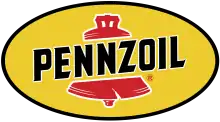Pennzoil
Pennzoil is an American oil company founded in Los Angeles, California in 1913. In 1955, it was acquired by South Penn Oil (a company started by Michael Late Benedum and Joe Trees),[1] a former branch of Standard Oil, headquartered in Oil City, Pennsylvania. In 1963, South Penn Oil merged with Zapata Petroleum, and the merged company was named "Pennzoil". In 1968, a United Gas Corporation was purchased by Pennzoil,[2] through a leveraged buyout, which was necessary because Pennzoil did not have enough assets to buy United outright.
 Pennzoil's current version of its logo. The company has used variations of this logo since the 1920s. | |
| Type | Subsidiary |
|---|---|
| Genre | Automotive service |
| Founded | 1913 |
| Headquarters | , |
| Products | Motor oil for automotives and motorcycles |
| Services | Motor oil service |
| Parent | Royal Dutch Shell |
| Divisions | Jiffy Lube |
| Website | pennzoil |

During the 1970s, the company moved its offices to Pennzoil Place in Downtown Houston, Texas.[3]
In 1977 a spin-off company was formed called POGO, an acronym for Pennzoil Offshore Gas Operators.[4]
In 1999 Pennzoil's E&P business (known as PennzEnergy) was acquired by Oklahoma City-based Devon Energy and the business now known as the Pennzoil-Quaker State Company was purchased by Royal Dutch/Shell Group to form SOPUS—Shell Oil Products US.
Gasoline
Though not much emphasis has ever been placed on gasoline, Pennzoil does sell gasoline.[5] In the early parts of the company's history, the gas stations were branded as Pennzip, though they were later changed to Pennzoil. For decades, Pennzoil gas stations were mostly marketed in western Pennsylvania, western New York, northern and eastern Ohio, and northern West Virginia.
In the 1990s, Pennzoil gas experienced a bit of a revival when Pittsburgh area convenience store chain Cogo's began co-branding themselves with Pennzoil. The co-branding lasted only a few years, and Cogo's switched brands to BP and Exxon in 2001.
After Shell's purchase of Pennzoil, there was the possibility that the remaining Pennzoil stations—mostly in western Pennsylvania—would be converted to Shell as part of the company's aggressive movement to expand nationally. This hasn't happened, but the three company-owned Pennzoil gas stations in the New Castle, Pennsylvania, area began co-branding themselves with 7-Eleven in 2003, with more emphasis placed on the 7-Eleven brand name than Pennzoil itself.
As of June 2009, only one Pennzoil/7-Eleven combination remains, as another converted to BP in 2006 while retaining 7-Eleven (a Pennzoil in Ambridge, Pennsylvania, also converted to BP at the same time). On June 8, 2009, the other Pennzoil/7-Eleven was sold to private owners and became an independent, unbranded location. There is also a surviving Pennzoil station in Ashtabula, Ohio, right off of Ohio State Route 11.
Commercial automotive and motorcycle partnerships
Pennzoil is an official long-term recommended motor oil of all Fiat Chrysler Automobiles companies (including all of brands and subsidiaries), BMW, Mini, Rolls-Royce, Hyundai, Chevrolet (shared with Mobil 1 and Valvoline), Ferrari, Iveco and Opel (shared with Mobil 1) for automobiles in United States. Pennzoil is also an official long-term recommended motorcycle engine oil of BMW Motorrad and Ducati for motorcycles in United States.
Motorsports
USAC National Championship drivers Al Unser and Johnny Rutherford were sponsored by Pennzoil in the Chaparral team. Rutherford won the Indianapolis 500 and the championship in 1980. From 1983 to 1990, Pennzoil sponsored the Team Penske driver Rick Mears during his CART World Series campaign, winning the 1984 and 1988 Indianapolis 500. IndyCar Series driver Sam Hornish Jr. drove for Pennzoil-sponsored Panther Racing from 2001 to 2003. Since 2011, Team Penske driver Hélio Castroneves has been sponsored part-time by Pennzoil, most notably at the Indianapolis 500. Pennzoil's yellow car livery has been nicknamed the "Yellow Submarine".
In the Monster Energy NASCAR Cup Series, Dale Earnhardt, Inc. had a Pennzoil sponsorship for Steve Park in their No.1 car from 1998 to 2003. Richard Childress Racing driver Kevin Harvick had a Pennzoil sponsorship from 2007 to 2010. Penske Racing took over the Pennzoil sponsorship in 2011 with Kurt Busch and in 2012, it was moved over to A. J. Allmendinger and to Joey Logano in 2013. Starting in 2018, Pennzoil has sponsored the Las Vegas Monster Energy NASCAR Cup Series spring race, Pennzoil 400.
Pennzoil was the title sponsor of the Grand Prix of Houston in 2013.
Pennzoil also has been the official motor oil of German-American GTLM team BMW Team Rahal Letterman Lanigan Racing since 2015 season and also American Formula One team Haas F1 Team since 2016 season.
Pennzoil sponsors NHRA's Don Schumacher Racing and drivers Matt Hagan (Funny Car) and Leah Pruett (Top Fuel).
They also sponsor driver Ken Block, best known for his Gymkhana series on YouTube.
Pennzoil also partnered Formula One giants Scuderia Ferrari and MotoGP giants Ducati Team due to Shell partnership.
Pennzoil, Co. v. Texaco, Inc.
In 1984, Pennzoil made an informal but binding contract with Getty Oil to purchase a large portion of Getty Oil, in order to give Pennzoil rights to Getty's oil deposits.[6] Following the deal, the Texaco oil company, operating under the belief the deal was not yet final, encroached on the complex merger in an attempt to acquire Getty for itself.[7]
Pennzoil sued Texaco in Texas state court, alleging that Texaco tortiously induced Getty to breach the contract with Pennzoil. At first it was adjudicated by Judge Anthony J.P. Farris; it was finished by visiting Judge Solomon (Sol) Casseb of San Antonio. A jury awarded Pennzoil, represented by Joe Jamail and Baine Kerr, $7.53 billion in compensatory damages and $3 billion in punitive damages. Under Texas law, Pennzoil could secure a lien on all of Texaco's property in the state, unless Texaco posted a bond that covered the judgment, interests and costs of the lawsuit (estimated to be $13 billion).[8]
Before judgment could be entered in the Texas court and Pennzoil could obtain a lien, Texaco filed a suit in the U.S. District Court for the Southern District of New York, alleging that the Texas proceedings violated Texaco's constitutional rights. The District Court found for Texaco, and the Second Circuit affirmed.[9] Pennzoil appealed the federal court case to the United States Supreme Court. Laurence H. Tribe argued for Pennzoil, whereas David Boies argued for Texaco. The Supreme Court reversed the circuit court decision, on the grounds that the federal court in New York should have abstained from interfering with the decision of a state court.[10]
Texaco also appealed the Texas state court decision. The Texas Court of Appeals upheld the jury verdict, but found that the trial court had abused its discretion by not suggesting a remittitur (reduction of damages). It would allow the verdict to stand if Pennzoil filed a remittitur of two billion dollars, making the punitive damages award $1 billion.[11] Compensatory damages of $7.53 billion remained unaffected. Pennzoil paid Mr. Jamail $335 million and Mr. Kerr $10 million for the victory.
After Texaco filed for bankruptcy, Pennzoil agreed to settle the case for $3 billion. [12]
See also
References
- Ansell, Martin R. (1998). Oil Baron of the West - Edward L. Doheny and the Development of Petroleum Industry in California and Mexico. Columbus, Ohio: Ohio State University. ISBN 0-8142-0749-9.
- "PENNZOIL". Texas State Historical Association (together with the University of North Texas's "University Libraries"). Retrieved December 19, 2013.
In 1965 the Liedtke brothers achieved the dramatic takeover of United Gas Corporation, a company five times the size of Pennzoil. Among United Gas Corporation's affiliates were the United Gas Pipeline Company of Shreveport, [...] Union Producing Company; Duval Corporation, [...] and Atlas Processing Company. In 1968 United Gas was merged into Pennzoil, and the firm was renamed Pennzoil United, Incorporated.
- "General Conditions and Legal Notices." Pennzoil. February 14, 1998. Retrieved on January 17, 2010.
- "W.C. Liedtke; Co-Founder of Pennzoil". Los Angeles Times. 4 March 1991.
- http://articlesguidance.org/the-complete-history-of-pennzoil-y7h4s/
- Petzinger, Jr., Thomas (1988). Oil and Honor The TEXACO-PENNZOIL Wars. New York, New York: Berkley. ISBN 0-425-11172-5.
- Beatty, Jeffrey (2008). Legal Environment. Mason, Ohio: South-Western Cengage Learning. p. 144. ISBN 978-0-324-78654-5.
- Pennzoil Co. v. Texaco Inc., 481 US 1, 5 (1987).
- Pennzoil Co. v. Texaco Inc., 481 US 1, 5,6 (1987).
- Pennzoil Co. v. Texaco Inc., 481 US 1, 10-18 (1987).
- Texaco, Inc v. Pennzoil Co., 729 SW 2d 768, 785, 866 (1987).
- Lewin, Tamar (December 19, 1987). "Pennzoil-Texaco Fight Raised Key Questions". New York Times. Retrieved March 3, 2013.
